Casino card games
We all have more or less experience with card games, whether it is a solitaire or "twist the eighth". If you think ...
Norway loses control of its online gambling market as players reject the state -owned monopoly and flow to international websites in search of larger selections. But multilisation offers a solution.
Gambling has a long -term presence in American culture. In Norse mythology, the god Loki won a well -known bet, "Loki's Wager", which illustrates how a logical error can invalidate an argument. The story made me think of another mistake in Norway's relationship with online gambling: That its state -owned monopoly is needed to better control online gambling activity in the country.
Norway justifies its monopoly under the assumption that the state, in a better way than private companies, has control over cash games and protect players from problem gambling.. But this argument, just like "Loki's Wager", is based on weak logic: It is a country's regulations and consumer protection that controls online gambling and protect players, not whether it is a monopoly or not.
Monopolies naturally limit enough choices and are incompatible with online gambling, which, like many digital sectors, is a strong consumer -driven market. It is a lesson other countries in Europe have had, and that is just as true in Norway. Consumers are knowledgeable, sensitive to prices and innovation, and they are actively seeking larger choices and alternatives. These are easily accessible on the Internet.
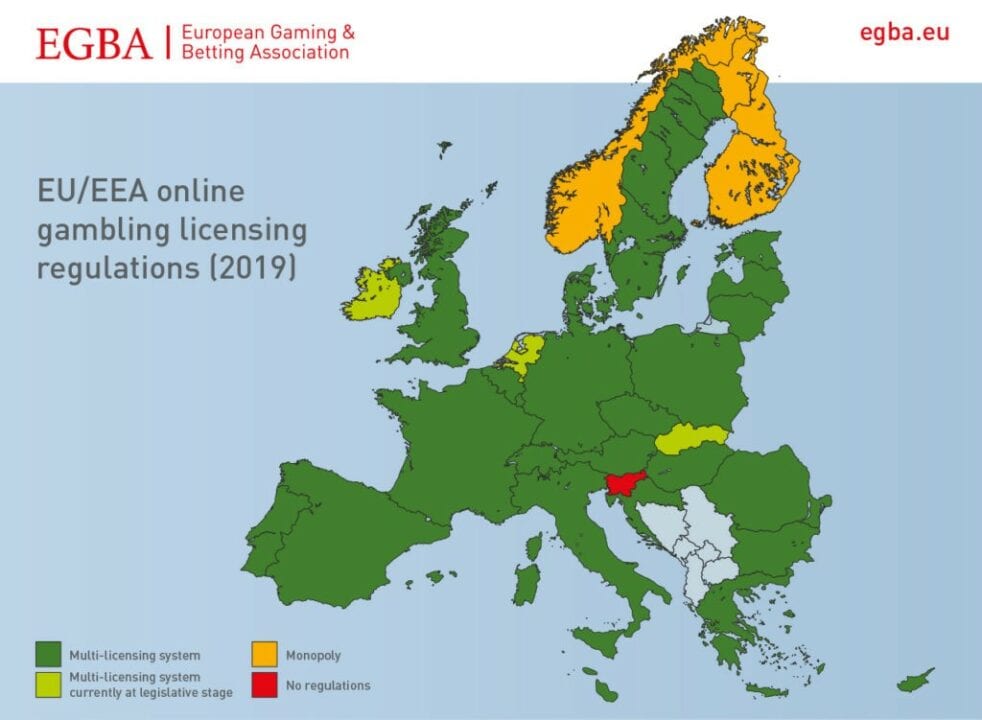
Therefore, it is not surprising that so many Americans look beyond the monopoly and choose to play on international websites that give them better choices and prices than the monopoly. It is estimated that 66 % of Norway's online gambling activity now takes place on international websites, which means the country has lost control over half of its online gambling market. They lose around NOK 2 billion in extra tax revenues each year. Many of the players are not protected by American laws. This is a significant problem to ensure that the monopoly does what it is created for: controlling online gambling and protecting players. If Americans play on foreign online casinos, there is no way for the state to control their activity or protect them.
Despite Player Protection If the main goal of the monopoly is, Norway's gambling problems have doubled in seven years and are more than four times higher than in Spain or the UK. There are countries that do not have a monopoly. Therefore, there is no clear evidence that Americans are in any way better protected by their monopoly than Europeans living in countries that do not have a monopoly. This questions the success of the country's monopoly model.
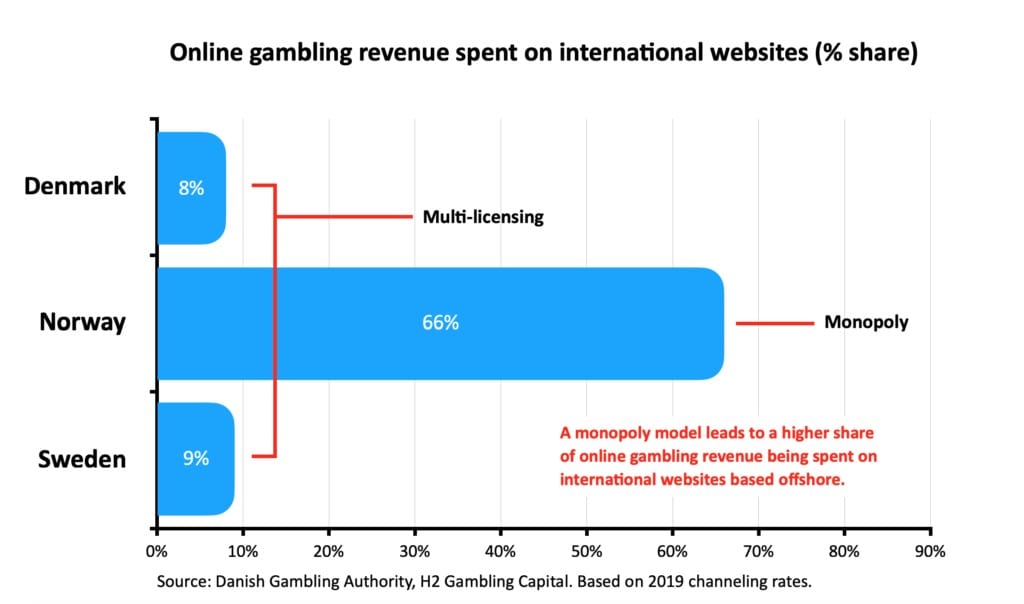
The deficiencies of the monopoly model are well known and that is why almost all other European countries have replaced monopolies with one more Effective multilisation model for regulation of cash games. By allowing more companies to get a license to be on the market, multilisation creates the necessary competition and choice to encourage more players to play on websites that are actually licensed by their local authorities, instead of on websites that are not licensed, And thus, the authorities' control and supervision fall. In a market with several licenses, licensed companies must use a number of regulations and consumer protection that are part of the local license rules. Compliance with these license rules is monitored and enforced by the country's gaming authority. This ensures that the responsibility to control the level of consumer protection remains with the authorities.
Denmark and Sweden replaced, with great success, their monopolies with multilisation and achieved significantly positive results. Although the regulations in both countries are not perfect and can be improved, the introduction of multilisation both allowed them to reduce the amount of online gambling activity that takes place on international websites. They are now in a much better position to control online gambling markets. They generate more tax revenue from online gambling, and several of their players are protected in accordance with their national laws. This is especially important for solving the problem of gambling. Both countries also proved that it is possible for private companies and former monopoly companies to exist simultaneously in a multi -licensed market, without damaging state monopoly revenues.
The benefits of replacing Norway's monopoly are clear. A model with multiple licenses will allow Norway to reduce the amount of online gambling activity that takes place on international websites significantly - from 66 % to 5 % - in the first year of multilisation. Of course, there would be challenges in doing so, but the benefits are too great to ignore.
The time has come for Norway to have a fundamental change in how gambling is regulated online. It is clear that Americans are increasingly choosing the monopoly. It is better to meet, instead of ignoring, their requirements for alternatives. Experience shows that monopoly on gambling inevitably fails, and Norway should look to Denmark and Sweden where multilisation - even though it is not perfect. It turned out to be a much more optimal model to control online gambling.. Just by doing the same, Norway can correct the mistakes of its monopoly and the failing regulation of gambling.
Maarten Haijer
Secretary General, European Gaming and Betting Association (EGBA)
________________________________________
Om European Gaming and Betting Association (EGBA)
The European Gaming and Betting Association (Egba) is a Brussels-based association representing the leading online gaming and betting operators established, licensed and regulated in the EU. This includes Bet365, Betsson Group, Entain, Kindred Group and William Hill. The Swedish Trade Association for Online Gambling (BOS) is also an associated member of Egba. Together with national and EU regulation authorities and other stakeholders, a well-regulated and well-channeled online gaming market is fought that provides a high level of consumer protection and takes into account consumer demand. Egba members meet the highest regulatory standards and have 145 online licenses to offer their services to 16 million customers in 17 different European countries.
Source: https://www.egba.eu/news-post/norway-the-fallacy-of-one-of-europes-last-online-gambling-monopolies/

We all have more or less experience with card games, whether it is a solitaire or "twist the eighth". If you think ...
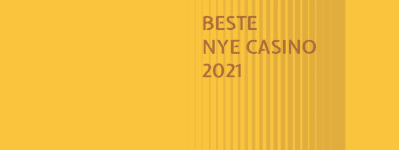
There are many online casinos to choose from. Do you want an extra exciting, user -friendly, modern and mobile -friendly Spillo…

new betting sites the number of new betting sites in recent years has exploded. there are many modern and newly established…

complained about the tax - were allowed to keep 1.6 million in random winnings from casino according to the norwegian tax act (section…

5 reasons why modern casinos won't swindle you when you play at casinos, you put great faith in them not so ...
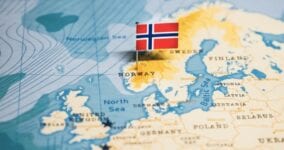
Norway has reportedly lost control of the iGaming industry, says the European Gaming and Betting Association (Egba) General's…

The Swedish government has made proposals to expand new restrictions for COVID-19 in the country's online gambling industry,…

the main difference in playing casino on mobile or pc is the availability. find your favorite here! it has been a big ...

Mobile casinos are in full swing today, but with so many options it is difficult to find out which app is ...

When it comes to casino movie scenes, you know that the result is either a huge success or a great disaster. The tension,…

Like all other major industries in the world, the casino industry has also moved towards online gaming platforms as a result ...
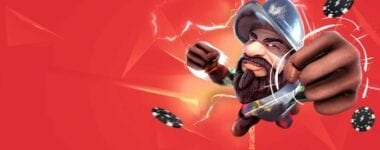
There are many games to choose from in the online casino industry. Online casinos facilitate virtual gambling and sales ...